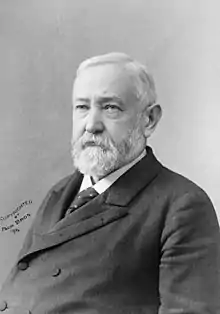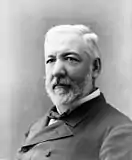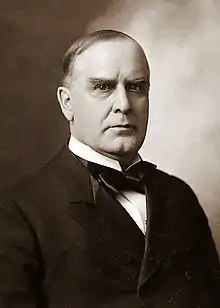1892 Republican National Convention
The 1892 National Convention of the Republican Party of the United States was held at the Industrial Exposition Building, Minneapolis, Minnesota, from June 7 to June 10, 1892. The party nominated President Benjamin Harrison for re-election on the first ballot and Whitelaw Reid of New York for vice president.[1]
| 1892 presidential election | |
  Nominees Harrison and Reid | |
| Convention | |
|---|---|
| Date(s) | June 7–10, 1892 |
| City | Minneapolis, Minnesota |
| Venue | Industrial Exposition Building |
| Chair | William McKinley |
| Candidates | |
| Presidential nominee | Benjamin Harrison of Indiana |
| Vice presidential nominee | Whitelaw Reid of New York |
| Other candidates | James G. Blaine William McKinley |
| Voting | |
| Total delegates | 906 |
| Votes needed for nomination | 454 |
| Results (president) | Harrison (IN): 536 (59.16%) Blaine (ME): 183 (20.2%) McKinley (OH): 182 (20.09%) Reed (ME): 4 (0.44%) Lincoln (IL): 1 (0.11%) |
| Ballots | 1 |
James S. Clarkson of Iowa was the outgoing chairman of the Republican National Committee. J. Sloat Fassett of New York was Temporary Chairman, and Governor William McKinley Jr. of Ohio was the Permanent Chair of the convention.
Harrison's Secretary of State James G. Blaine, who had resigned from the cabinet on June 4, 1892, the eve of the convention, had his name submitted for consideration by the delegates, but drew little support. Future president William McKinley tied Blaine for second place among the delegates.
Although successful in his bid for renomination, President Harrison's performance was underwhelming for an incumbent, in part to the crushing defeat that the party had suffered in the 1890 mid-term elections. He and Reid would lose the fall 1892 election to former President Grover Cleveland and Adlai Stevenson.
The 1892 RNC was also the first convention where women were allowed to be delegates. Therese Alberta (Parkinson) Jenkins, delegate from Wyoming, cast the first vote by a woman for president; Wyoming had granted full suffrage for women at statehood in 1890.
Results
Presidential ballot


Former Secretary of State
James G. Blaine
of Maine
(Draft Effort)
Governor
William McKinley
of Ohio
(Draft Effort)
Senator
John Sherman
of Ohio
(Declined to Contest)
| Presidential Ballot | Vice Presidential Ballot | ||
| Ballot | 1st | Ballot | 1st |
|---|---|---|---|
| Benjamin Harrison | 535.17 | Whitelaw Reid | 906 |
| James G. Blaine | 182.83 | ||
| William McKinley | 182 | ||
| Thomas B. Reed | 4 | ||
| Robert Todd Lincoln | 1 | ||
Source: US President - R Convention. Our Campaigns. (January 8, 2010). Source: US Vice President - R Convention. Our Campaigns. (September 7, 2009).
Vice Presidential ballot
Vice President Levi Morton was dumped from the ticket, as Harrison was not particularly fond of Morton, who was closer to Blaine supporters.[2] Morton was replaced by Ambassador Whitelaw Reid of Ohio.
This was also the first, and so far only, time in U.S. political history where the presidential and vice presidential nominees were both graduates from the same university: Harrison and Reid were graduates of Miami University located in Oxford, Ohio.
Republican Party Platform
The Republican platform supported high tariffs, bimetallism, stiffer immigration laws, free rural mail delivery, and a canal across Central America. It also expressed sympathy for the Irish Home Rule Movement and the plight of Jews under persecution in czarist Russia.
- The representatives of the Republicans of the United States, assembled in general convention on the shores of the Mississippi River, the everlasting bond of an indestructible Republic, whose most glorious chapter of history is the record of the Republican Party, congratulate their countrymen on the majestic march of the nation under the banners inscribed with the principles of our platform of 1888, vindicated by victory at the poll and prosperity in our fields, workshops and mines, and make the following declaration of principles:
- We reaffirm the American doctrine of protection. We call attention to its growth abroad. We maintain that the prosperous condition of our country is largely due to the wise revenue legislation of the Republican Congress.
- We believe that all articles which cannot be produced in the United States, except luxuries, should be admitted free of duty, and that all imports coming into competition with the products of American labor, there should be levied duties equal to the difference between wages abroad and at home. We assert that the prices of manufactured articles of general consumption have been reduced under the operations of the tariff act of 1890.
- We denounce the efforts of the Democratic majority of the House of Representatives to destroy our tariff laws by piecemeal, as manifested by their attacks upon wool, lead and lead ores, the chief products of a number of States, and we ask the people for their judgement thereon.
- We point to the success of the Republican policy of reciprocity, under which our export trade has vastly increased and new and enlarged markets have been opened for the products of our farms and workshops. We remind the people of the bitter opposition of the Democratic party to this practical business measure, and claim that, executed by a Republican administration, our present laws will eventually give us control of the trade of the world.
- The American people, from tradition and interest, favor bi-metallism, and the Republican party demands the use of both gold and silver as standard money, with such restrictions and under such provisions, to be determined by legislation, as will secure the maintenance of the parity of values of the two metals so that the purchasing and debt-paying power of the dollar, whether of silver, gold, or paper, shall be at all times equal. The interests of the producers of the country, its farmers and its workingmen, demand that every dollar, paper or coin, issued by the government, shall be as good as any other.
- We commend the wise and patriotic steps already taken by our government to secure an international conference, to adopt such measures as will insure a parity of value between gold and silver for use as money throughout the world.
- We demand that every citizen of the United States shall be allowed to cast one free and unrestricted ballot in all public elections, and that such ballot shall be counted and returned as cast; that such laws shall be enacted and enforced as will secure to every citizen, be he rich or poor, native or foreign-born, white or black, this sovereign right, guaranteed by the Constitution. The free and honest popular ballot, the just and equal representation of all the people, as well as their just and equal protection under the laws, are the foundation of our Republican institutions, and the party will never relax its efforts until the integrity of the ballot and the purity of elections shall be fully guaranteed and protected in every State.
SOUTHERN OUTRAGES
- We denounce the continued inhuman outrages perpetrated upon American citizens for political reasons in certain Southern States of the Union.
FOREIGN RELATIONS
- We favor the extension of our foreign commerce, the restoration of our mercantile marine by home-built ships, and the creation of a navy for the protection of our National interests and the honor of our flag; the maintenance of the most friendly relations with all foreign powers; entangling alliances with none; and the protection of the rights of our fishermen.
- We reaffirm our approval of the Monroe Doctrine and believe in the achievement of the manifest destiny of the Republic in its broadest sense.
- We favor the enactment of stringent laws and regulations for the restriction of criminal, pauper and contract immigration.
MISCELLANEOUS
- We favor efficient legislation by Congress to protect the life and limbs of employees of transportation companies engaged in carrying inter-State commerce, and recommend legislation by the respective States that will protect employees engaged in State commerce, in mining and manufacturing.
- The Republican party has always been the champion of the oppressed and recognizes the dignity of manhood, irrespective of faith, color, or nationality; it sympathizes with the cause of home rule in Ireland, and protests against the persecution of the Jews in Russia.
- The ultimate reliance of free popular government is the intelligence of the people, and the maintenance of freedom among men. We therefore declare anew our devotion to liberty of thought and conscience, of speech and press, and approve all agencies and instrumentalities which contribute to the education of the children of the land, but while insisting upon the fullest measure of religious liberty, we are opposed to any union of Church and State.
- We reaffirm our opposition, declared in the Republican platform of 1888, to all combinations of capital organized in trusts or otherwise, to control arbitrarily the condition of trade among our citizens.
- We heartily indorse the action already taken upon this subject, and ask for further such legislation as may be required to remedy any defects in existing laws, and to render their enforcement more complete and effective.
- We approve the policy of extending to towns, villages and rural communities the advantages of the free delivery service, now enjoyed by the larger cities of the country, and reaffirm the declaration contained in the Republican platform of 1888, pledging the reduction of letter postage to 1 cent at the earliest possible moment consistent with the maintenance of the Post Office Department and the highest class of postal service.
- We commend the spirit and evidence of reform in the civil service, and the wise and consistent enforcement by the Republican party of the laws regulating the same.
NICARAGUA CANAL
- The construction of the Nicaragua Canal is of the highest importance to the American people, both as a measure of National defense and to build up and maintain American commerce, and it should be controlled by the United States Government.
TERRITORIES
- We favor the admission of the remaining Territories at the earliest practicable date, having due regard to the interests of the people of the Territories and of the United States. All the Federal officers appointed for the Territories should be selected from bona-fide residents thereof, and the right of self-government should be accorded as far as practicable.
ARID LANDS
- We favor the cession, subject to the homestead laws, of the arid public lands, to the States and Territories in which they lie, under such Congressional restrictions as to disposition, reclamation and occupancy of settlers as will secure the maximum benefits to the people.
THE COLUMBIAN EXPOSITION
- The World's Columbian Exposition is a great national undertaking, and Congress should promptly enact such reasonable legislation in aid thereof as will insure a discharge of the expenses and obligations incident thereto, and the attainment of results commensurate with the dignity and progress of the Nation.
INTEMPERANCE
- We sympathize with all wise and legitimate efforts to lessen and prevent the evils of intemperance and promote morality.
PENSIONS
- Ever mindful of the services and sacrifices of the men who saved the life of the Nation, we pledge anew to the veteran soldiers of the Republic a watchful care and recognition of their just claims upon a grateful people.
HARRISON'S ADMINISTRATION
- We commend the able, patriotic and thoroughly American administration of President Harrison. Under it the country has enjoyed remarkable prosperity and dignity and honor of the Nation, at home and abroad, have been faithfully maintained, and we offer the record of pledges kept as a guarantee of faithful performance in the future.
See also
- History of the United States Republican Party
- List of Republican National Conventions
- U.S. presidential nomination convention
- 1892 United States presidential election
- 1892 Democratic National Convention
References
- "Different twin city, but a similar RNC tale 116 years later". Twin Cities. 2008-08-10. Retrieved 2018-05-29.
- "Levi Parsons Morton, 22nd Vice President (1889-1893)". US Senate. US Senate. Retrieved 9 October 2015.
- History of American Presidential Elections Volume II 1848-1896; Schlesinger; Pgs 1739-1741
Bibliography
- Huber, Molly. "Republican National Convention, June 1892." http://www.mnopedia.org/event/republican-national-convention-june-1892 MNopedia. Minnesota Historical Society. April 26, 2011. Accessed November 3, 2012.
External links
- Republican Party platform of 1892 at The American Presidency Project
- Harrison acceptance letter at The American Presidency Project
| Preceded by 1888 Chicago, Illinois |
Republican National Conventions | Succeeded by 1896 St. Louis, Missouri |